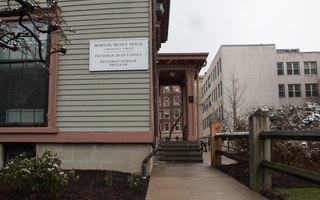Last week, we published a staff editorial criticizing Dean of the College Rakesh Khurana for his decision to reject a proposed pre-matriculation bridge program for low-income and first generation College freshmen. In our editorial, we asked Dean Khurana to explain his reasons for rejecting the program; he and Dean of Freshman Thomas A. Dingman ’67 have done so in their recent op-ed.
We thank Dean Khurana and Dean Dingman for responding to student criticism surrounding this decision, but we remain confident that a pre-matriculation program would be invaluable for first generation, low-income, and under-resourced students throughout their transition.
We support administrators’ new initiatives to expand post-matriculation resources, but we do not believe these resources negate the need for pre-matriculation support. Dean Khurana and Dean Dingman argued that bolstered post-matriculation resources, including a new “First Gen, Low-Income Student Advocate” in the Freshman Dean’s Office, would be sufficient to help support these students. They correctly note that post-matriculation resources are often underused.
In our view, however, the problem is not a lack of demand but a lack of awareness. Students do not know these resources are available or do not know how to access them. A pre-matriculation bridge program could help resolve the problem of underutilization, as it would teach incoming freshmen about these resources. While the Deans acknowledge the need to further support first generation, low-income students, they have yet to explain why expanding post-matriculation resources would be incompatible with a summer bridge program. Post-matriculation and pre-matriculation are not mutually exclusive, and they should not be viewed as such.
Furthermore, we believe that a summer bridge program would be able to provide preventative rather than remedial measures for these students on campus. Programming should be designed so that if students face academic and emotional struggles, they already know how to seek help from the FDO, Bureau of Study Counsel, or the First Gen Low-Income Advocate. It would ensure that these students do not feel alone in their challenges and have the tools to succeed before they even know they need them.
Many first generation, low-income, and minority students have been vocal about their desire for pre-matriculation support. They have worked hard to propose a solution to the problems they faced. Though the FDO has internal polling data about the success of pre- and post-matriculation support, these students’ views should be taken into account as well. We also urge administrators to be transparent, providing students with access to the data so they can help suggest solutions.
Given that the College has decided to focus its resources on post-matriculation support, we call for student involvement in the selection and hiring of the Advocate position in the FDO. First generation and low-income students can help ensure the new Advocate understands the experiences of those they are there to help. Further, the College should actively reach out to the would-be beneficiaries of the bridge program instead of placing the burden on the students to seek them.
We appreciate Dean Khurana and Dean Dingman’s commitment to providing resources for post-matriculation support. But we also hope that the bridge program is not forgotten and the dialogue continues, especially so that that pre-matriculation resources may be expanded in the future.
This staff editorial solely represents the majority view of The Crimson Editorial Board. It is the product of discussions at regular Editorial Board meetings. In order to ensure the impartiality of our journalism, Crimson editors who choose to opine and vote at these meetings are not involved in the reporting of articles on similar topics.
Read more in Opinion
This We’ll DefendRecommended Articles
-
I Can’t SpeakI imagine what it might have been like to be born into a family of college graduates where money and experience could comfortably guide me towards a secure future. I wonder what it would have been like to be like them—the seeming majority of Harvard’s student body that, unlike me, isn’t first-gen, low-income, or a minority.
-
Our Approach to Support First Generation and Low-Income StudentsOur decision not to pursue an early program at this time reflects our informed judgment that a holistic post-matriculation approach is better suited to address the multiple challenges many of these students face in transitioning to life at Harvard.
-
 College to Pilot Pre-Orientation Program for Members of 'Historically Marginalized Communities'
College to Pilot Pre-Orientation Program for Members of 'Historically Marginalized Communities' -
 College Will Merge OSL, FDO Into One Student Life Office
College Will Merge OSL, FDO Into One Student Life Office -
 The FDO-OSL Merger, Explained
The FDO-OSL Merger, Explained













